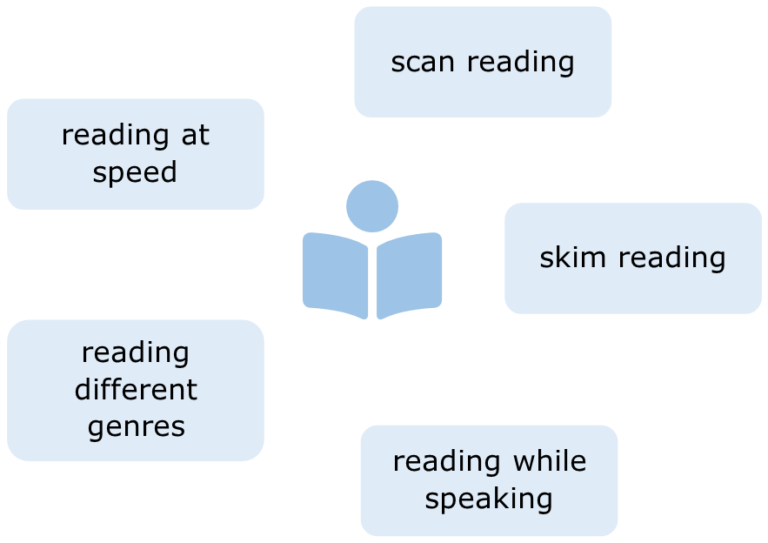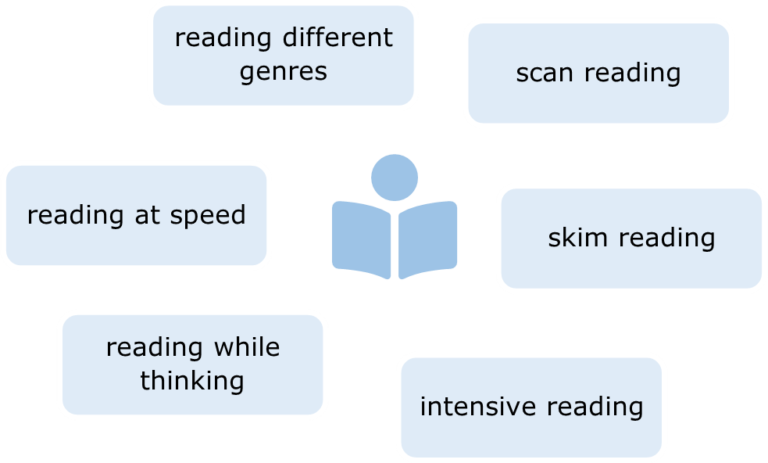Which reading skills are helpful at university?

This is the first of two chapters about Academic Reading Skills. To complete this reader, read each chapter carefully and then unlock and complete our materials to check your understanding.
– Introduce the three core reading skills
– Discuss the six additional reading subskills
– Explore how skills and academic contexts interact
Before you begin reading...
-
video and audio texts
-
knowledge checks and quizzes
-
skills practices, tasks and assignments
Chapter 1

Whether you’re participating in a classroom or are conducting research at home, reading is a key academic skill– one that can take many years to perfect. The challenges and benefits of reading in academic contexts such as in seminars and study groups may not be obvious at first, but for those students who invest in learning to read effectively, the impact it can have on academic assignments is invaluable.
As we will see in this reader, successful academic reading involves the mastery of a variety of reading skills and strategies, such as skim reading, reading at speed and dealing with unknown vocabulary. In Chapter 1, we first pay attention to reading skills and subskills before discussing in Chapter 2 how purpose for reading, genre, speed and vocabulary can all have an impact on reading success.
Core Reading Skills
There are three key skills that relate to reading, each of which is commonly required at university. These are skimming, scanning and reading intensively:
- skim reading is when a reader gets an overall impression of a text by looking at any images, by quickly reading any headings and subheadings and by potentially also skimming the introduction and conclusion for key information
- scan reading is more commonly used to find specific pieces of information within a text, such as statistics, dates or names and examples; like skimming, when scanning, the reader doesn’t read every word and instead only reads the necessary information
- reading intensively requires that the reader follows a text very carefully, perhaps looking for the deeper meaning such as by determining what the author really thinks about that subject
In addition to these three key skills, there are a number of supportive skills that effective readers also tend to employ. As you can see from the following list, most of these require competent skills in multitasking, which is the ability to do multiple things at the same time (such as read and think). These subskills are:
- reading while listening (visual aids, PPTs)
- reading while speaking (giving answers, discussions)
- reading while thinking (formulating questions and responses)
- reading at speed (class activities, examinations)
- reading for different purposes (leisure, informative, critical)
- reading different genres (essays, literature reviews, reports)

Academic Reading Contexts
How these skills are used by a reader often depends on the reading context. Two of these contexts are particularly common (and important) in academic settings:
1. Classroom Seminars
A seminar is intended to be an interactive process between a tutor and their learners. Although that tutor will often take time to lecture about subject-specific topics and concepts, they will most likely also prepare tasks, discussions and handouts to engage their students actively. The tutor will usually have a PowerPoint or other visual aid to support and illustrate their topic and may also include video or audio clips. What this means is that students will be tasked with collaborative activities that will require them to read and respond appropriately, utilising skills such as skim and scan reading, reading at speed and reading different genres. Learn to master these skills and you stand a better chance of benefitting from your seminars and participating with other students effectively.

2. Independent Research
Also involving effective reading skills is the process of research, which will take up most of a student’s out-of-class study time. Reading is in fact key to this process, enabling you to increase your subject knowledge through investigation of a module’s core reading texts as well as any wider reading. Research reading is also important when preparing for seminar topics, assignments and when completing assessed submissions such as essays and presentations. To conduct research successfully will therefore involve many of the same skills as required by a seminar, but will additionally call for intensive, critical reading as well as reading while thinking.

While these two contexts might be the most common in terms of reading at university, students can also expect to have to rely upon reading skills to:
- complete assessments
- understand assessment feedback
- follow lecture slides and handouts
- navigate module documents and timetables
- respond to electronic correspondence
- benefit from campus posters, flyers and noticeboards
Now that we’re familiar with the most common reading skills and academic reading contexts, the second and final chapter in this reader on Academic Reading Skills aims to explore aspects such as purpose and genre that impact reading skills.
Downloadables
Once you’ve completed both chapters in this short reader about Academic Reading Skills, you might then wish to download our Chapter Worksheets to check your progress or print for your students. These professional PDF worksheets can be easily accessed for only a few Academic Marks.
Chapter 1 explores the topic: Which reading skills are helpful at university? Our Chapter 1 Worksheet (containing guidance, activities and answer keys) can be accessed here at the click of a button.
Chapter 2 explores the topic: Does purpose, genre and speed impact reading? Our Chapter 2 Worksheet (containing guidance, activities and answer keys) can be accessed here at the click of a button.
To save yourself 1 Marks, click on the button below to gain unlimited access to all of our Academic Reading Skills Chapter Worksheets. This All-in-1 Pack includes every chapter, activity and answer key related to this topic in one handy and professional PDF.
Collect Academic Marks
-
100 Marks for joining
-
25 Marks for daily e-learning
-
100-200 for feedback/testimonials
-
100-500 for referring your colleages/friends